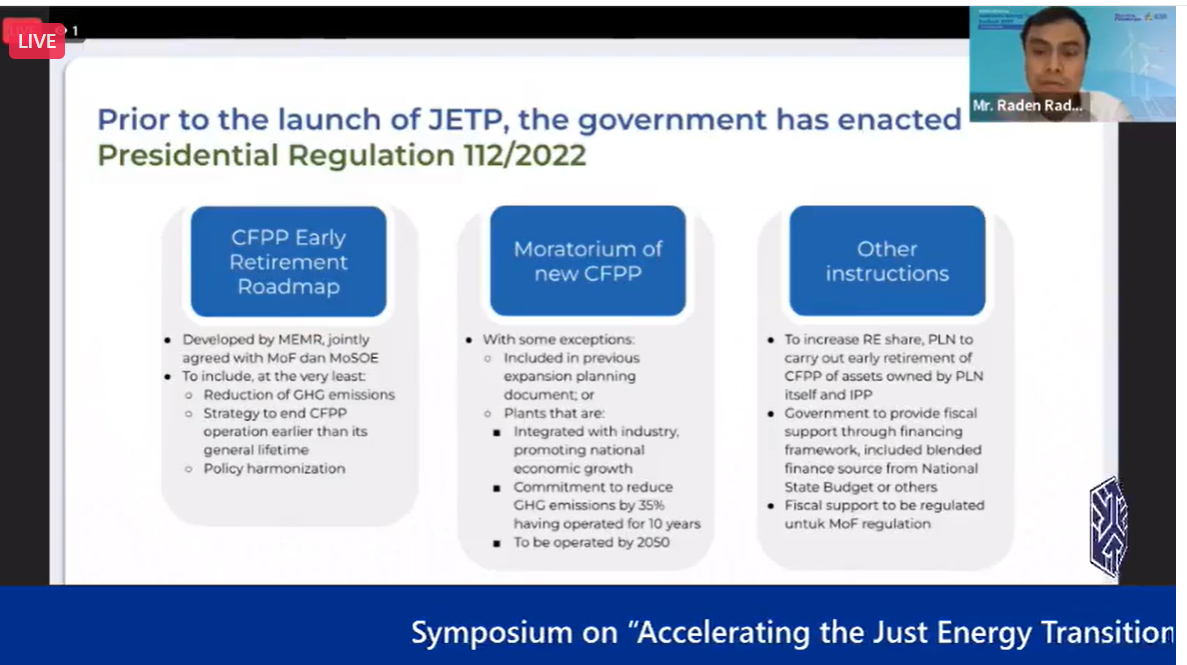Pakistan, May 31, 2023 – The energy transition is being discussed in many countries, including Pakistan. Some of the challenges faced by Pakistan in adopting renewable energy include inadequate electricity infrastructure and network integration. Similar to Pakistan, Indonesia also faces similar challenges. Still, the government’s fast action is needed to reduce the use of fossil energy as a concrete step to reduce greenhouse gas emissions.
Raden Raditya Yudha Wiranegara, Senior Researcher at the Institute for Essential Services Reform (IESR), explained the electricity sector contributes around 40% of greenhouse gas emissions in Indonesia based on the 2023 Indonesia Energy Transition Outlook (IETO) report and achieves net zero emission by 2060 or faster, Raditya said, it is necessary to transition all energy supplies. One is changing the electricity sector by gradually reducing fossil fuels in PLTU. According to Raditya, coal-fired power plants must be reduced or retired in stages until 2045 to align with the 1.5°C ambition.
“The first phase is carried out by closing 18 coal power plants with a total capacity of 9.2 GW until 2030, then 39 coal power plants with a total capacity of 21.7 GW, and 15 coal power plants with a total capacity of 12.5 GW,” explained Raditya in the Symposium on “Accelerating the Just Energy Transition in Pakistan” organized by the Sustainable Development Policy Institute (SDPI) on Wednesday (31/5/2023).
In fulfilling the 1.5°C ambition, Indonesia’s Just Energy Transition Partnership (JETP) is one of the driving forces. Raditya explained that the partnership includes a peak emission target 2030 for the Indonesian electricity sector, including on-grid, off-grid, and captive power generation systems, shifting the projected peak emissions by about seven years earlier. Apart from focusing on significant emission reductions, JETP is also promoting sustainable development and economic growth and protecting the livelihoods of people and workers in the affected sectors.
To implement this target, Raditya said, currently the JETP Indonesia Secretariat, is developing a comprehensive investment plan (CIP) for the Just Energy Transition Partnership (JETP) funding program. However, Raditya stressed the JETP Indonesia Secretariat only had a limited time to complete it, bearing in mind that the document needed to be published in August 2023. Regarding the work on the comprehensive investment plan document, Raditya emphasized that it was hoped that the analysis results in the working group could be included in it in July 2023. The working groups in JETP Indonesia consist of 4 working groups representing various parties, including the Indonesian government, national and international institutions, and elements of civil society who have expertise in their respective fields. The working group oversees Technical, Policy, Funding, and Equitable Transition.
“Reflecting on these conditions, transparency and availability of data is a problem in the working group. This needs to be a concern considering that these conditions can hinder each group member from carrying out the assigned tasks,” said Raditya.
The CIP document will contain technical, funding, policy, and socio-economic information regarding energy transition investments in the electricity sector up to 2030 which will form the basis for implementing the USD 20 billion partnership under JETP Indonesia. Based on the JETP Indonesia Joint Statement, funding mobilization is targeted to occur in years 3 to 5 after the JETP Indonesia funding partnership is agreed upon. In addition, the investment areas that have been agreed upon in the CIPP consist of developing transmission and distribution networks, early retirement of coal-fired power plants, accelerating the use of baseload type renewable energy, accelerating the use of variable type renewable energy, and building a renewable energy supply chain.

